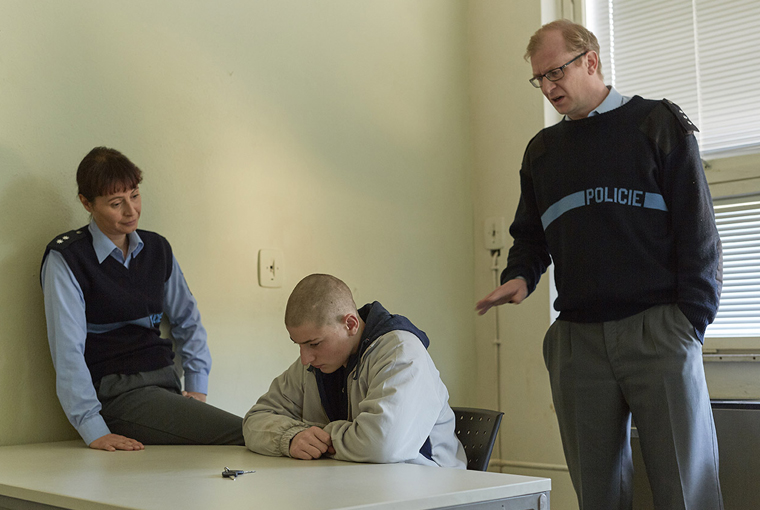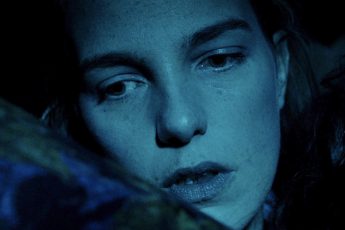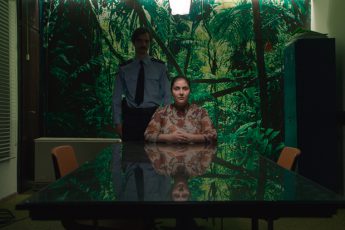“He’s got an overactive imagination and a sentimental side”
Olmo Omerzu’s Winter Flies (Všechno bude, 2018)
Vol. 86 (Summer 2018) by Jack Page
Foulmouthed skinhead Mara hijacks a car, picking up unlikely buddy Hedus to embark on a spontaneous road trip adventure together. The boys’ story unfolds in a series of flashbacks that cut between the blithe spiritedness of their shenanigans and the harsh reality of Mara’s police interrogation. What unfolds is a series of events that will test the boundaries of their friendship, their courage and their resistance to conform to the oncoming obstacles of adulthood that lie ahead.
Endearing imbecile Hedus is the first runaway to be introduced in Winter Flies. Clad in camouflage gear from head to toe, he spends his days shooting an assault rifle BB gun at oncoming traffic. His round, cherubic face holds no sense of malice and his aimless game is a product of restless boredom. When Mara threatens to leave him on the side of the road, Hedus wrestles himself onto the bonnet of the moving car until his friend yields and allows him ownership of the passenger seat. His clumsiness – flattered by a humorous slapstick performance – portrays Hedus as an innocent youth rather than a menace to society. His character’s musical accompaniment relies heavily on a playful, upbeat tune. The cartoonish high notes of the flute (which Hedus sometimes whistles to himself) encapsulate the feeling of childish wonder and his penchant for being easily distracted and aloof.
During their joyride, Mara and Hedus encounter a variety of soulless figures of authority in an otherwise parentless narrative. Their path is not paved by wanton destruction but jovial misdemeanors and petty pranks. These moments of careless abandon are disrupted only by the presence of the adult world and the unsympathetic culpability Mara and Hedus associate with them. Apart from Mara’s grandfather, all adult characters are vilified in Winter Flies. A local villager endeavors to sell them a stray dog before drowning it in the river. An ex-partner of Brana (the third and final addition to the ragtag team of misfits) is a violently abusive biker. Most importantly, Mara’s manipulative interrogation officer both physically bullies and emotionally blackmails her detainee to ascertain a truthful testimony, feigning the death of his beloved grandfather. This blatantly obvious negative portrait of adulthood is a somewhat uninspired expression of childhood anxiety and expected of any film told from the perspective of juvenile delinquent protagonists. The aim of Mara and Hedus is reduced to merely outsmarting or overcoming the interference of the adult world by saving animals, enacting daring prison breaks or standing up to their oppressors. Unfortunately, this is often resolved by simply running away from their problems at the most opportune time and signified by a musical motif. A catharsis is steadily built up by a rhythmic military drum roll and the deep, plodding notes of a heavy brass band that isn’t unlike The Great Escape theme. The repetition of this melodic formula throughout the film ensures that the finale of any dramatic sequence is predetermined and the audience can expect equilibrium in the impending frames.
There is however a particularly affecting scene that promises the spectator a real coming of age turning point in regards to character development. Around the campfire, an intoxicated Brana begins to mother her new comrades, theatrically feeding them like a bird. Mara and Hedus glance furtively at one another, their eyes sharing a similar, hopeful look of romantic desperation. Their idea of a quick sex fix is soon dashed however, when Brana leaves the boys alone to check her mobile phone. Illuminated by the light of its screen, her facial expression indicates she is the recipient of an abusive text message from her ex-boyfriend, and she swears in exasperation. Genuinely distraught, she returns to the campfire (her body language notably depressive) while the boys plead ignorance. Marching past them, Brana heads straight to the shelter of the car, where she shares the comfortable backseat with the dog Jackal and quickly falls into a drunken stupor. After failing to wake her, Mara and Hedus are resigned to their fate and attempt to share a sleeping bag together. The last shot of the scene frames them from a bird’s-eye view, Hedus spooning Mara from behind, huddling together for warmth. Sexually frustrated and with their egos deflated, the reality of their sexless situation and inability to flirt is realized in the cold light of day. Interestingly, this is another shortcoming that they share, which brings them closer together (however embarrassingly). When Mara imparts some misplaced, adolescent wisdom onto Hedus, there is a bond that is developed from their trial and error approach to courtship. Their resolve is endearing and when it is used for good – protecting the innocent, executing escape plans, for example – the belligerence of these two misfits dwindles as they transform into a couple of unlikely guardian angels.
Omerzu’s film is good-natured and well-meaning, but perhaps to a fault. Winter Flies does effectually capture a timeless feeling of youth in which we wish to be emancipated from our parents and teachers. Yet, such independence comes at a cost – that of unbridled responsibility and safety – which we are not yet prepared for. This very struggle between a fear of being alone and the dream of self-government is the basis of Mara and Hedus’ rebellion. As a result, their adventure is inescapably predestined to return home. Throughout the narrative, the stakes are never high enough to elicit any real sense of danger or unexpectedness. Even during the film’s most dramatic moments, the boy’s innocence is only shaken, but never in any real danger of being lost completely.




Leave a Comment